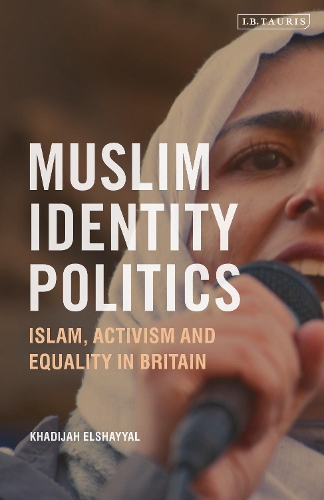
Muslim Identity Politics: Islam, Activism and Equality in Britain
(Paperback)
Publishing Details
Muslim Identity Politics: Islam, Activism and Equality in Britain
By (Author) Khadijah Elshayyal
Bloomsbury Publishing PLC
I.B. Tauris
28th November 2019
United Kingdom
Classifications
Tertiary Education
Non Fiction
Political control and freedoms
Ethnic groups and multicultural studies
Terrorism, armed struggle
Civics and citizenship
Religious institutions and organizations
Law and society, sociology of law
Social discrimination and social justice
Right-of-centre democratic ideologies and movements
Human rights, civil rights
305.6970941
Physical Properties
Paperback
336
Width 138mm, Height 216mm
404g
Description
The surge in divisive and far-right politics and growing Islamophobia in Britain pose new challenges for Muslim advocacy organisations. British Muslim activism has taken centre stage in the public sphere as a result. Yet for over fifty years Muslim advocacy groups have worked to preserve religious identity, lobby the state and provide concerted responses to the political establishment. This is the first book to chart critically the national and global factors influencing the political mobilisation of British Muslim activists as Muslims. Khadijah Elshayyal traces the changes of thought, direction and method within Muslim identity politics after 1960, noting key organisations and turning points such as the Rushdie Affair, the 9/11 attacks, the 7/7 bombings and the current conflict in Syria. The book argues that the Rushdie Affair prompted new debate around the subject of freedom of expression, which has continued to be a point of contention ever since. Providing a history of the interaction between Muslim advocacy groups and the state, and the impact of state policy on Muslim communities, Muslims Identity Politics shows that that Muslim citizens continue to experience an `equality gap' and recommends where transformation and progress can be made. Based on primary sources and in-depth interviews, this book is a vital resource for government officials, policy-makers and researchers interested in multiculturalism, Islamophobia and security issues in Britain.
Reviews
Elshayyal offers insight into the limits, discrepancies and contradictions of the political agendas of both government and Muslim bodies, and makes legal and pragmatic suggestions for how both sides could move forward ... Students would do well to read Muslim Identity Politics along with Jed Fazakarleys Muslim Communities in England, as both are necessary additions to existing studies of Muslim identity formation in Britain, and both will complement future research and reading groups with a focus on British Islam and its sociology, history and presence in national politics. * Islam and Christian-Muslim Relations Journal *
Author Bio
Khadijah Elshayyal is Postdoctoral Research Fellow at Edinburgh University's Alwaleed Centre for the Study of Islam in the Contemporary World, where she also teaches courses on Islam and Muslims in Britain at undergraduate and postgraduate levels. She holds a PhD in History from Royal Holloway, University of London, and her research interests lie in the representation, political and cultural engagement of Muslims and ethnic minorities in the UK.
